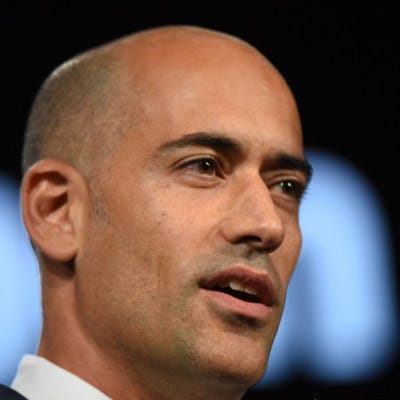“There are urgent threats to our democracy that clearly need to be addressed: voting rights, access, security. These are all short-term. What hasn’t been addressed for decades are the fundamental structures of how our democracy works. That’s where RepresentUs fits.”
—Joshua Graham Lynn
That is how clearly Joshua Graham Lynn spoke about his organization’s mission when I interviewed him on my podcast, Lori on Leadership. The non-partisan, non-profit organization he leads, RepresentUs, works city by city, state by state to fix America’s political system and strengthen its democracy. By “fix”, he means do the heavy lifting to correct the corruption, dysfunction, and lack of representation that have become its hallmark.
As Josh said, “We can’t take freedom for granted…. At its core, our work at RepresentUs is about making sure the American people not only have a voice in our government but the loudest voice. We strive to build an America where our government is truly representative, responsive and accountable to the people.”
Josh Lynn is a seasoned storyteller and “buzz” master. He studied graphic design in America and Italy, began working as a web developer, and then moved into brand management. Besides launching and managing numerous international brands, he developed power-building platforms for organizations. His work was honoured by the Rebrand 100 Awards, the Webby Awards, American Package Design Awards, the Clios, and the ADDYs. All this led to four years of service as program director at United Republic, a 501(c)(4) campaign finance reform group.
In 2012, Josh co-founded RepresentUs with Josh Silver as a project of United Republic. The two Josh’s secured a high-profile bipartisan board of advisors, including Trevor Potter (former Federal Elections Commissions Chair), Jack Abramoff (lobbyist turned reformer), representatives from Occupy Wall Street and the DC Tea Party Patriots, and Teddy Roosevelt’s great grandson Theodore IV. Silver worked with policy experts, including Potter, to craft the American Anti-Corruption Act, an aspirational framework for reform that remains a blueprint for securing democracy.
Rather than go straight to Congress with this model legislation, the two-cofounders chose to focus on addressing state and city laws that are in need of significant reform. This strategy of gaining momentum at the local level has historically secured wins (for example, interracial marriage, women’s suffrage, and marriage equality), and is proving successful for anti-corruption reform.
Over the last decade, RepresentUs has racked up 171 political wins in states and localities to pass ranked choice voting, as well as anti-gerrymandering, anti-corruption, voting access, campaign finance, and ethics reforms. The organization has grown from two co-founders to a scrappy and smart 30-person team of policy experts and movement leaders, 24,000+ volunteers and 38,000+ donors. It has also attracted big-name actors and musicians as cultural advisors. National exposure through short films and ads has garnered 1 billion social media impressions, 160 million viral video views and 1.5 million petition signatures. (Check out the video watch list below, featuring Jennifer Lawrence, Omar Epps, Ed Helms, Michael Douglas, Mark Ruffalo, Katy Perry, Orlando Bloom, and Sia.)
Key Takeaways
Below are 10 interesting takeaways from our dialogue on leadership, culture and movement building.
Have something to strive for that is not today’s stock price. If you’re fighting for something noble like democracy or broader freedoms, you have to be thinking long term. Remember your strongest opposition will have been fighting for decades on the exact same issues.
Decide where your resources are best spent. Will they add value on top of a trillion-dollar industry that is already working on these things? Or are your resources better spent on the long-term work that only a few organizations are doing?
Put your organization in front of yourself. Keep the focus on what matters: its stability, steadiness and growth. Keep yourself out of the news. Learn from the exemplary CEOs of Hewlett Packard, GM, General Foods, Human Rights Campaign or any organization that has consistently done well with a similarly “invisible” leader at the helm.
Let people’s expectations of their workplace raise the bar for your leadership. People don’t come to work just to earn money and spend time. Their workplace is their therapy, healthcare, and their friend group. Create a culture that naturally attracts self-driven individuals who want to be part of something bigger than themselves.
Co-develop cultural agreements with your people. Talented individuals want to work in an excellent workplace. They also want their agency. They already know what it takes for things to be excellent. So let them all have a voice in the framing of those agreements.
Be the one who does the hard work of bringing everyone together. Acknowledge that you don’t know everything and that the key to your leadership is to hire people who (collectively) do. Be more conscious and vulnerable, more open and inquisitive with the talented people surrounding you.
Don’t leave the important things unsaid. Be upfront with decision rights. Clarify whether you’re asking for an opinion or a solution. Clarify whether permission is required or not. And when things are not yet clear, use the power of the pause to give yourself time to think before you speak!
Make feedback okay. Create a culture in which anyone can give feedback to the CEO without feeling threatened. In a first one-on-one with a new team member, talk about when and how to give and receive feedback (everyone has preferences). Develop enough trust so you can share feedback when it needs to happen “right now”.
Don’t be afraid to ask your employees what they want—and then give it to them. Obviously, don’t just give things away, especially if it's not good for the company. But don’t deny them unnecessarily either.
Steal from what works. Big organizations spend billions of dollars to make something look and feel a certain way. If you're starting something, think about what you really want that to be, find things that look exactly like that, and borrow the pieces that fit. Tweak them until they become something new. When it comes to building movements, learn from those who have spent their lives successfully doing so, people like Erica Chenoweth and Rachel Kleinfeld. Understand that you don’t have to “make” a movement. You have to put your idea out there and let people make it their own.













